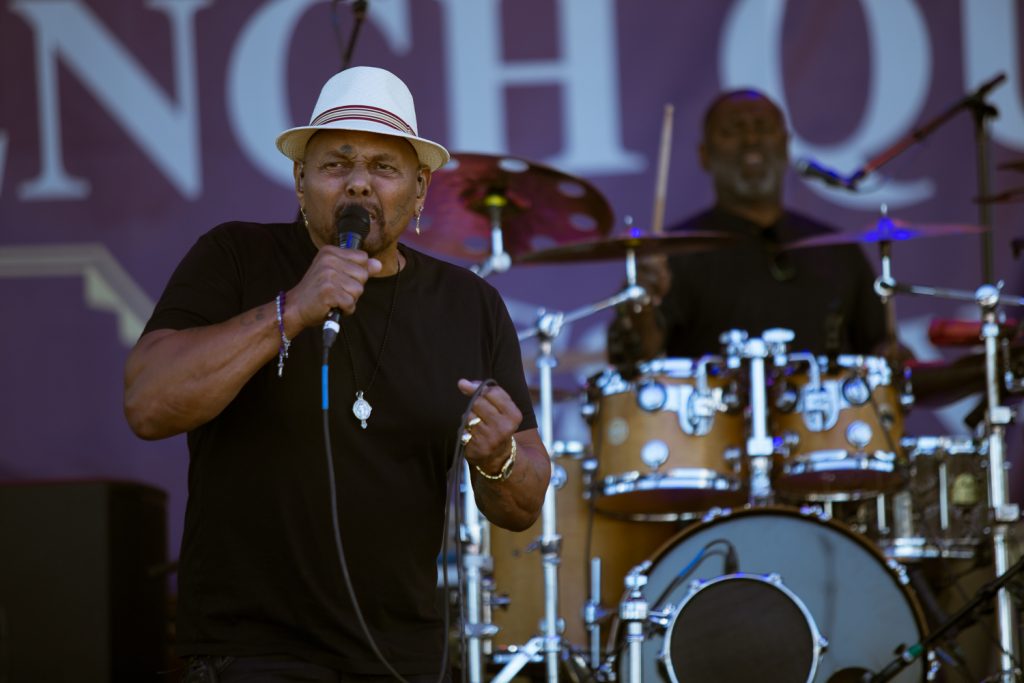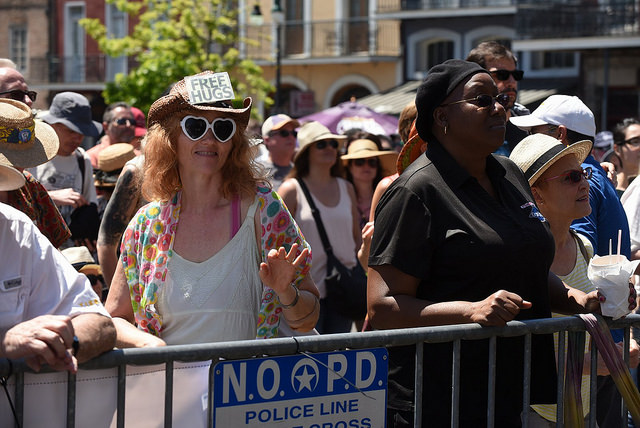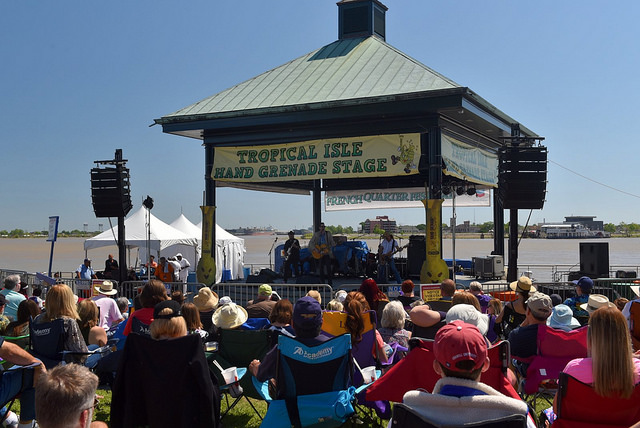Since its humble beginning in 1984, French Quarter Fest has grown into the largest free music festival in the country. And why wouldn’t it? The past four days featured hundreds of Louisiana favorites across 23 stages, including beloved artists like Aaron Neville, Irma Thomas, Honey Island Swamp Band, Kermit Ruffins & the Barbecue Swingers, Walter “Wolfman” Washington, Tank and The Bangas, John Boutte, the Soul Rebels, Astral Project and many more. It should surprise no one that offering all of this great music free of charge draws hordes of people to the French Quarter year after year.
Limited space is going to be an issue at any gathering of this size, and that’s especially true for an event that stays confined to a few streets and a sliver of land along the river. However, there’s one particular nuisance that makes the problem much worse than it should be at French Quarter Fest—and countless other local fests for that matter. Yes, that’s right. I’m talking about the chairs.
You see, the chair situation at French Quarter Festival has gotten out of hand. This isn’t as much of a problem at many of the smaller stages, but it’s gotten increasingly close to unbearable at the “main” stages that play host to the event’s biggest acts. In the run up to Aaron Neville’s headlining set on Thursday, for instance, I patiently worked my way through the sardine can that was the outer part of the crowd in search of a decent viewing spot for the show. When I finally reached a solid vantage point, I was surprised—well, more like angered—to find that a substantial portion of the stage’s most valuable real estate was filled with plastic folding chairs, many of them unoccupied. It wasn’t just behind the soundboard either. A lot of these chairs were taking up space in the very front of the crowd.
Look, I get it. Standing around all day isn’t for everyone. I’m not trying to argue that these folding chairs should be banned outright. Chair-dwelling festivalgoers, who I will henceforth refer to as “chairfolk,” are an integral part of the festival community. Nevertheless, chairfolk come in a variety of shapes, sizes and demeanors. Some of them lack the common sense or common courtesy to not set up camp three feet from the stage in a mass of 20,000 people. In a clear case of what psychologists call projection, some of them even think the people navigating their chair labyrinths and stepping on their sacred blanket spaces are the rude ones in the crowd.
So in the interest of making the festival experience better for everyone (except the rude chairfolk, of course), I’ve brainstormed a few changes that could help bring this problem under control. If you’ve ever been on the receiving of an angry “this is not a walking lane” from someone who treats the three foot radius around their cluster of folding chairs like the Alamo, these were devised with your well-being in mind. Fair warning: there is some sarcasm ahead.
“No Chairs Beyond This Point” signs – The space in front of the stage is for boogying. That last sentence was considered for use in the Bill of Rights during America’s first constitutional convention, but was wisely discarded because it has nothing to do with establishing a system of government. Still, the sentiment remains completely true and there’s no denying the founding fathers were onto something when they proposed it. There’s a reason events like Jazz Fest and Bayou Boogaloo have carved out chair-free zones in the areas close to their stages. It reserves space for the people who want to dance and get a great view of their favorite artists. The average folding chair takes up roughly the same amount of surface area as 3.5 standing adult humans (disclaimer: this number is not scientific in any way), so it simply isn’t right for a single chairfolk to have that much high-value real estate to themselves. This one is kind of a no-brainer. Jazz Fest still has a big problem in this regard too, but at least they’ve taken small steps to solve it. French Quarter Fest should follow their lead here.
Start charging a “chair fee” – It’s no secret that French Quarter Fest has gotten pretty darn big in recent years. Like I said earlier, that’s to be expected considering the incredible talent the festival brings in. The lack of a cover charge certainly helps draw the crowds too. I would never suggest changing the free entry policy that has made French Quarter Fest the juggernaut it is today, but there are plenty of potential benefits in making the chairfolk pay up. On the one hand, it would bring in extra revenue for the festival. On the other hand, it would inspire a lot of people to leave their chairs at home. Those that pay once could be given a sticker to ensure they aren’t charged again if they leave the official festival grounds. The fee wouldn’t even need to be that high. $10? $20? The right to complain when people inevitably trip over the plastic piece of furniture you’ve set up in a densely packed sea of humans? All of those sound like reasonable prices to me.
Throw chairs that have been left unoccupied for more than 5 minutes into the river – There’s nothing more frustrating than seeing a long wall of unoccupied chairs taking up space during a show at one of the main stages. It’s even worse when you see these chairs’ respective chairfolk standing in front of their throne as they watch the performance. If an open folding chair takes up as much space as 3.5 standing humans, then that number increases to 4.5 if we count the person who is standing while their chair remains unused. I didn’t mean to bore you with math there, but the point is that unoccupied chairs add insult to injury. To avoid this problem, French Quarter Festival security could be given the power to toss any unoccupied chairs into the river as a means of freeing up much needed space and sending a message to other potential offenders. If that’s too much of a strain on security resources, then maybe volunteers can be recruited for the job. Perhaps they can even be allowed to write the value of any chairs they toss off on their taxes. I’m not an accountant or a lawyer though, so I’m not sure if that’s how taxes work.
On second thought, I take that back. The Mighty Mississippi is polluted enough as it is. Adding an admittedly large amount of plastic to the mix isn’t going to help clean it up. The gist of the idea is still solid, but the method needs some fixing. Is it possible to melt unoccupied chairs down and sell them as scrap plastic? Or how about they throw them into a woodchipper like the one Steve Buscemi found himself in at the end Fargo instead?
Engage in common courtesy – This suggestion goes out to the chairfolk themselves. Dearest chairfolk: I understand that it’s hot out there during the day. I understand that it’s tiring to stand up and walk around for hours. I understand that the festival is a lot more comfortable when you have a place to sit. And I respect all of that! You have every right to sit, and many of you do so responsibly. But some of you do not. Some of you really need to take a moment to think before plopping down a chair and stretching out your legs at the front of a crowd you know will soon be filling up with people. Some of you should ask yourselves, “Why is it that I deserve to have 3.5 persons’ worth of prime concert-viewing real estate during a headlining set?” Some of you should consider folding up your chairs and setting them down in front of you when you decide to stand up for extended periods of time during a popular show. If you set up camp anyway, then you only have yourself to blame when an endless stream of people trip over your legs and bump into your chair while traversing the crowd. You may think that Great Wall of Chairs you’ve built is your divine right as a conqueror of the chairless frontier, but I assure you no one else sees it the same way.
French Quarter Fest is a fantastic event that brings thousands of people to New Orleans every year and provides a platform for some of Louisiana’s greatest musicians—whether they’re world famous, underappreciated or anything in between—to be heard. If implemented, these changes could go a long way toward freeing up space for even more people to enjoy what the fest has to offer.







